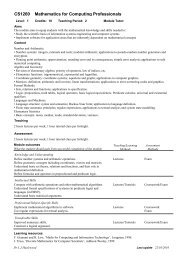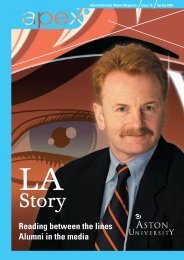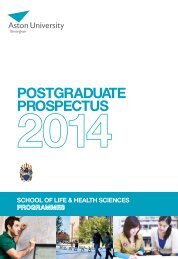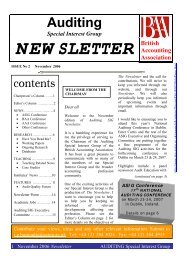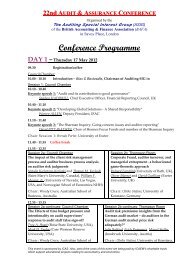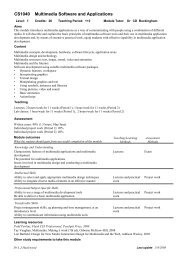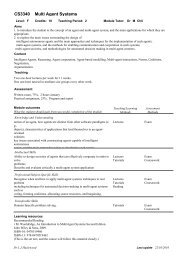Postgraduate ProsPectus - Aston University
Postgraduate ProsPectus - Aston University
Postgraduate ProsPectus - Aston University
Create successful ePaper yourself
Turn your PDF publications into a flip-book with our unique Google optimized e-Paper software.
School of Engineering & Applied Science<br />
MSc Telecommunications Technology<br />
School of Engineering & Applied Science<br />
MSc by Research in Mathematics of Complex Systems<br />
Key facts<br />
1 year full-time: six months of taught<br />
modules on campus and a six month<br />
individual project, possibly within industry.<br />
This programme is also available via<br />
distance learning within the UK or flexible<br />
CPD study (this option usually takes 2-5<br />
years: 2-3 years of taught modules delivered<br />
through the <strong>University</strong>’s virtual learning<br />
environment and a project of 1-2 years).<br />
Start date: October<br />
Intake: Up to 25 per year<br />
Specific subject requirements<br />
A first or good second class Honours<br />
Degree from a UK academic organisation<br />
in a relevant engineering field, science or<br />
closely related discipline. Qualifications<br />
from outside the UK or a combination of<br />
qualifications and experience will also be<br />
considered. International students whose<br />
native language is not English will also<br />
need to demonstrate English Language<br />
ability (please see page 37 for details).<br />
Key benefits<br />
Prepares students for an<br />
intellectually challenging career as<br />
a qualified engineer<br />
Provides students with a thorough<br />
grounding in the principles and the<br />
requisite specialist knowledge and<br />
skills to develop, manage and adapt<br />
current systems<br />
Accredited by the Institution of<br />
Engineering and Technology (IET)<br />
An industrial advisory group reviews<br />
the programme on a continual basis<br />
Guest lectures presented by acknowledged<br />
experts drawn from industry<br />
Free student membership of the IET.<br />
What are my career prospects?<br />
The programme will be of interest<br />
to students in technical careers<br />
related to the design/development<br />
of telecommunications systems,<br />
or to those wishing to enter<br />
telecommunications research. The<br />
programme provides a means whereby<br />
graduates from nontelecommunications<br />
technical degrees can move<br />
into this high demand area.<br />
Programme overview<br />
<strong>Aston</strong>’s long-established MSc in Telecommunications Technology<br />
is designed to develop or update the wide range of technical<br />
understanding, engineering “know-how” and professional skills<br />
needed to contribute effectively to the design and development of<br />
telecommunications systems. To ensure its continuing relevance the<br />
programme is monitored by an industrial steering committee which<br />
includes representatives from major employers.<br />
Outline of programme<br />
Module guide<br />
Taught modules and examinations/assessments are completed during<br />
six months, October to March. After successful completion students<br />
may then progress to the six month individual research project during<br />
April to October. The project is either undertaken in an industrial<br />
laboratory or at the <strong>University</strong>, often with guidance and direction from<br />
industrial partners.<br />
Core modules:<br />
Radio Systems and Personal Communications Networks<br />
Internetworking<br />
Information Theory and Coding and Traffic Theory<br />
Software Engineering<br />
Introductory Programming<br />
Digital Transmission<br />
Optical Communications<br />
Mobile Data Networks<br />
Realtime Communication Networks<br />
Project Preparation<br />
MSc Project.<br />
Who is it taught by?<br />
Programme Director<br />
Dr. Xiaohong Peng<br />
Dr. Peng teaches radio systems and mobile data networks in this MSc<br />
programme. His research areas range from wireless and multimedia<br />
communications and networks to sensor networks for healthcare<br />
and wellbeing. He has led research projects in both theoretical<br />
developments and practical system realisation through collaboration<br />
with industry in telecommunications, data storage and mobile<br />
communication networks. Dr Peng is a senior member of the Institute<br />
of Electrical and Electronic Engineers (SMIEEE).<br />
Application and contact<br />
MSc Admissions Officer<br />
T: +44 (0)121 204 3668<br />
F: +44 (0)121 204 3676<br />
E: seaspgtaught@aston.ac.uk<br />
Programme overview<br />
This programme is designed to train aspiring scientists and budding<br />
IT professionals who wish to rely on numerical proficiency to further<br />
their career goals. The programme consists of a training aspect of<br />
taught components (4 modules, first 3 months) and a significant<br />
interdisciplinary research project in complex systems (9 months).<br />
Research topics are chosen by students from a list of topics ranging<br />
from biology to finance and are supervised by academics from the<br />
Non-linearity and Complexity Research Group (NCRG) at <strong>Aston</strong>.<br />
Outline of programme<br />
Module guide<br />
This MSc integrates a taught component of four modules over three<br />
months (50 credits) with a substantial individual research project<br />
lasting nine months (130 credits).<br />
Core modules:<br />
Algorithms and Computational Mathematics (10 credits):<br />
Linear algebra, optimisation and numerical analysis<br />
Introduction to Methods of Statistical Physics (10 credits):<br />
Statistical physics and its applications<br />
Statistical Pattern Analysis and Probabilistic Modelling (15 credits):<br />
Probabilistic models, Bayesian inference, decision theory & Monte<br />
Carlo methods<br />
Stochastic and Non-Linear Dynamical Systems (15 credits):<br />
Dynamics of deterministic and random systems using ODEs,<br />
applications in biology & finance<br />
Research Project (130 credits): Research work in the general field of<br />
complexity to be jointly chosen by the supervisor and student.<br />
Who is it taught by?<br />
Programme Director<br />
Dr. Amit K Chattopadhyay<br />
After obtaining a Ph.D. in theoretical physics (2001), Dr. Chattopadhyay<br />
took up high profile research positions in Germany, UK, Italy and<br />
India. He has authored and co-authored over 30 publications in<br />
international peer reviewed journals and has been awarded the<br />
Alexander von Humboldt fellowship and the Marie Curie Incoming<br />
International Fellowship, the two highest research awards in Europe for<br />
his researches in mathematical biology and statistical physics. He is<br />
a co-author of a leading textbook in `Heat and Thermodynamics’ with<br />
the same title.<br />
Application and contact<br />
Research Student Coordinator<br />
T: +44 (0)121 204 3663 +44 (0)121 204 3500<br />
F: +44 (0)121 204 3685<br />
E: seasres@aston.ac.uk<br />
Key facts<br />
1 year full-time: three months of taught<br />
modules and a nine month individual<br />
project.<br />
2 years part time.<br />
Start date: October<br />
Intake: Approximately 10 per year for<br />
UK/EU students and 15 per year for<br />
international students<br />
Specific subject requirements<br />
Applicants must achieve a minimum<br />
of a 2:2 Honours Degree in a numerate<br />
science from a UK <strong>University</strong>, or an<br />
equivalent international qualification.<br />
The Programme Director may conduct<br />
an interview in person or by telephone.<br />
International students whose native<br />
language is not English will also need to<br />
demonstrate English Language ability<br />
(please see page 37 for details).<br />
Key benefits<br />
Unique training in theoretical<br />
interdisciplinary research<br />
Engagement with internationally<br />
recognised scientists<br />
Possibility to achieve (funded) PhD<br />
as a follow-up programme<br />
High demand for skilled individuals<br />
in R&D sectors in industry and in IT.<br />
What are my career prospects?<br />
The programme has been designed to<br />
meet the demand for mathematically<br />
skilled experts in the modelling and<br />
analysis of complex systems both in<br />
the academic and industrial arena.<br />
Graduates may be employed in a<br />
broad range of positions: research<br />
and development teams as a part of<br />
a large company, in start-ups, or as<br />
consultants. We expect a substantial<br />
fraction of graduates from this<br />
programme to join research teams in<br />
high-tech engineering and IT sectors.<br />
Previous evidence suggests that such<br />
employment prospects are good.<br />
Projects in collaboration with industrial<br />
partners provide excellent opportunity to<br />
forge links with industry that may result<br />
in subsequent employment.<br />
48 To find out more: Telephone: +44 (0)121 204 3400 | Email: engineering@aston.ac.uk | www.aston.ac.uk/eas<br />
www.aston.ac.uk<br />
49



